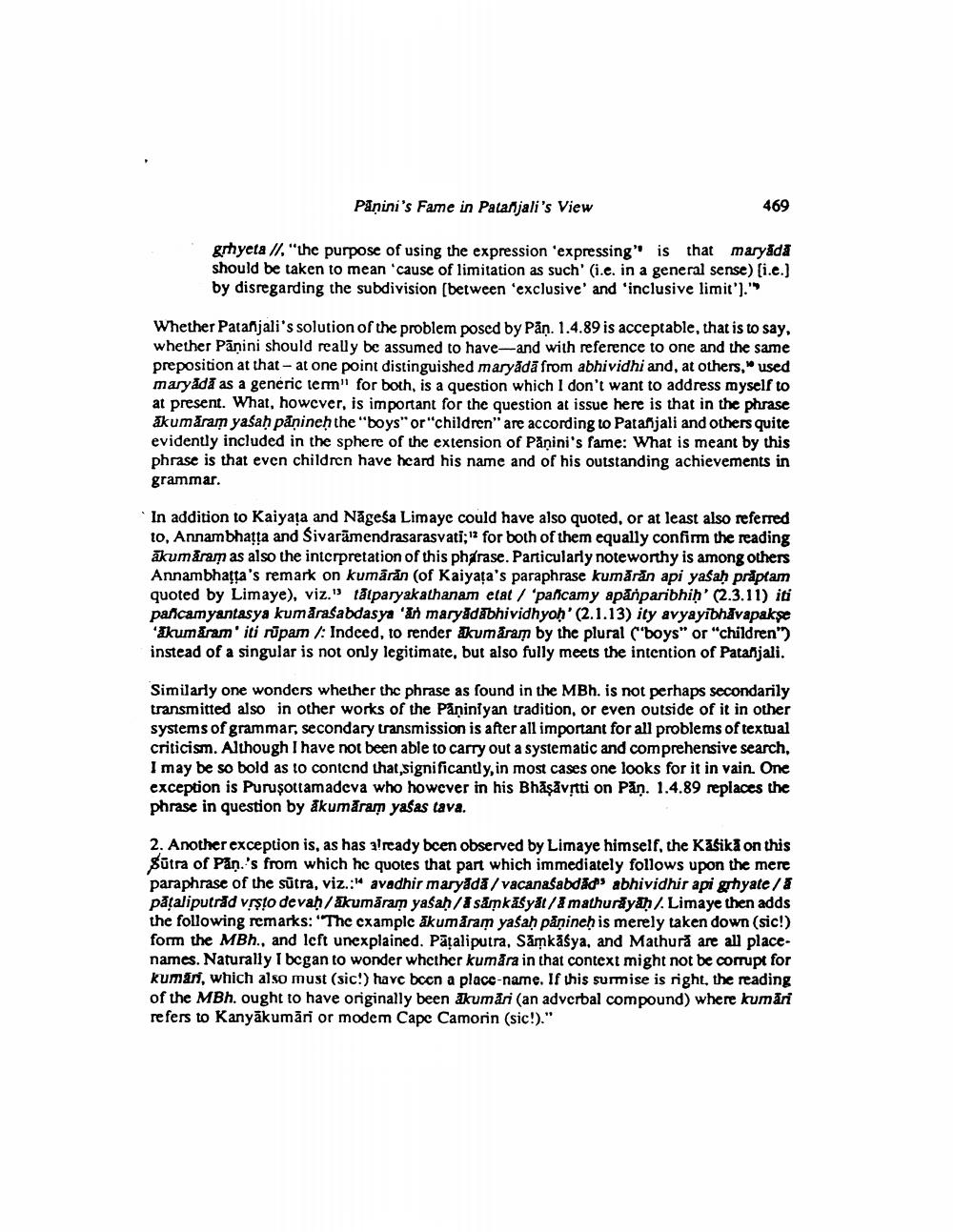Book Title: How Far Did Paninis Fame Really Extend In Patanjalis View Author(s): A Wezler Publisher: A Wezler View full book textPage 2
________________ Panini's Fame in Patanjali's View 469 grhyeta II, "the purpose of using the expression 'expressing" is that maryada should be taken to mean 'cause of limitation as such' (ie, in a general sense) (i.e.) by disregarding the subdivision (between exclusive' and 'inclusive limit'].'" Whether Patanjali's solution of the problem posed by Pān. 1.4.89 is acceptable, that is to say, whether Pānini should really be assumed to have—and with reference to one and the same preposition at that - at one point distinguished maryādā from abhividhi and, at others, used maryada as a generic term" for both, is a question which I don't want to address myself to at present. What, however, is important for the question at issue here is that in the phrase akumaram yaśaḥ pāņinch the "boys" or "children" are according to Patanjali and others quite evidently included in the sphere of the extension of Pāņini's fame: What is meant by this phrase is that even children have heard his name and of his outstanding achievements in grammar. In addition to Kaiyața and Nāgesa Limaye could have also quoted, or at least also referred 10. Annambhasta and Sivarāmendrasarasvati;" for both of them equally confirm the reading ākumăram as also the interpretation of this pharase. Particularly noteworthy is among others Annambhatta's remark on kumāran (of Kaiyata's paraphrase kumaran api yasah praptam quoted by Limaye), viz." tātparyakathanam etat / 'paficamy aparparibhiḥ' (2.3.11) iti palicamyantasya kumāraßabdasya 'an maryādābhividhyoh' (2.1.13) ity avyayibhāvapakse Ikumăram' iti rūpam : Indeed, to render akumāram by the plural (boys" or "children") instead of a singular is not only legitimate, but also fully meets the intention of Patanjali. Similarly one wonders whether the phrase as found in the MBh. is not perhaps secondarily transmitted also in other works of the Paninfyan tradition, or even outside of it in other systems of grammar, secondary transmission is after all important for all problems of textual criticism. Although I have not been able to carry out a systematic and comprehensive search, I may be so bold as to contend that significantly, in most cases one looks for it in vain. One exception is Purusottamadeva who however in his Bhāşāvrtti on Pan. 1.4.89 replaces the phrase in question by akumāram yasas tava. 2. Another exception is, as has already been observed by Limaye himself, the Kasika on this Sūtra of Pan.'s from which he quotes that part which immediately follows upon the mere paraphrase of the sutra, viz.: avadhir maryadă / vacanaSabdions abhividhir api grhyate / pătaliputrad vrsto devah/akumāram yasah/å såmkāsyåt/& mathurdyan / Limaye then adds the following remarks: "Thc cxamplc akumaram yaśaḥ påņine” is merely taken down (sic!) form the MBh., and left unexplained. Pataliputra, Samkāsya, and Mathură are all placenames. Naturally I began to wonder whether kumara in that context might not be corrupt for kumari, which also must (sic!) have been a place-name. If this surmise is right, the reading of the MBh. ought to have originally been akumari (an adverbal compound) where kumāri refers to Kanyākumāri or modem Cape Camorin (sic!)."Page Navigation
1 2 3 4 5 6 7 8 9 10 11
